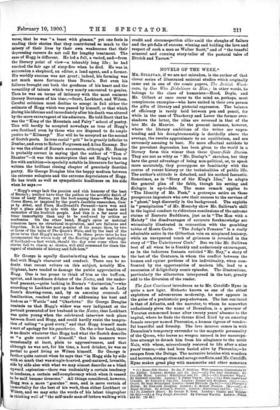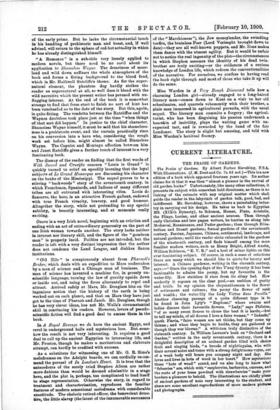NOVELS OF THE WEEK.*
Mn. SuLLIvax, if we are not mistaken, is the author of that clever series of illustrated satirical studies which originally came out in one of the comic papers, The British Work- man, by One Who Disbelieves in Him; in other words, he belongs to the class of humorists—Hood, Doyle, and Mr. Gilbert at once recur to the mind as, perhaps, most conspicuous examples—who have united in their own person the gifts of literary and pictorial expression. The balance of efficiency is rarely held between pen and pencil, for while in the case of Thackeray and Lover the former over- shadows the latter, the roles are reversed in that of the late Mr. du Manlier. In the present instance, however, where the literary ambitions of the writer are unpre- tending and his draughtsmanship is decidedly above the average, the results approximate to an equilibrium, and are extremely amusing to boot. No more effectual antidote to the prevalent depression has been given to the world in a literary form this winter than these Queer-Side Stories. They are not as witty as "Mr. Dooley's " sketches, but they have the great advantage of being non-political, or, to speak more accurately, they presuppose no familiarity with the course of recent history or the technicalities of public life. The author's attitude is detached, and his method fantastic. Sometimes, as in "Story of the King's Idea," he adopts the general plan of the fable, though his setting and dialogue is up-to-date. The same remark applies to "The Identity of Mr. Push," a grotesque satire on those prosperous impostors who owe their success to the services of a "ghost," kept discreetly in the background. The exploits in " precipitation " of Mr. Moozeby show Mr. Sullivan's skill in the logical conduct to ridiculous conclusions of the extreme claims of Esoteric Buddhists, just as in "The Man with a Malady" the disadvantages of accurate foreknowledge are whimsically illustrated in connection with the gambling tables of Monte Carlo. "The Judge's Penance" is a really admirable satire in the Gilbertian vein on misplaced leniency, while an unexpected touch of grimness is revealed in the story of "The Unbelievers' Club." But we like Mr. Sullivan best of all when he is frankly and audaciously extravagant, as in the ludicrous fantasia entitled "Mr. Hay," a story of the last of the Centaurs, in whom the conflict between the human and equine portions of his individuality, when com- fronted by the opportunities of modern life, lead to a succession of delightfully comic episodes. The illustrations, particularly the silhouettes interpersed in the text, greatly add to the diversion of the reader.
The Lost Continent introduces us to Mr. Catcliffe Hyne in quite a new light. Hitherto known as one of the ablest exploiters of adventurous modernity, he now appears in the guise of a prehistoric peep-showman. The lost continent is that of Atlantis, and the narrator, to whom he somewhat audaciously gives the name of Deucalion, is a governor of Yucatan summoned home after twenty years' absence to the capital, where he finds the throne filled filled by an amazing female usurper named Phorenice, a human tigress of wonder- ful beautiful and ferocity. The love interest comes in with Deucalion's temporary surrender to the magnetic personality of the Queen, who leaves no weapon unused in her unscrupu- lous attempt to detach him from his allegiance to the noble Nals, with whom, miraculously restored to life after a nine years' trance,—she had been buried alive by Phorenice,—he escapes from the Deluge. The narrative bristles with wonders and horrors, strange rites and savage conflicts, and Mr. eutcliffe Hyne makes great play with mammoths and other monsters • (1.) Queer-Side Stories. By Jas. F. Sullivan. With numerous Illustrations by the author. London : Downey and Co. [cs.]—(2.) The Lost Continent. Bi Cutcliffe Hyne. London : Hutchinson and Co. [6s.)—(S.) Shameless Wayne. By Halllwell Sutcliffe. London : T. Fisher Unwin. (es.)—(4.) With Sword and Crucifix. By Edward S. Van Zile. London : Harper and Brothers. [es.]-0.) Onora. By Rosa Mulholland. London : Grant Richards. [Ss. 6d.]—(6.) Pharaoh's Broker. By Elswortlx .Douglass. London : C. Arthur Pearson. [66.3--,-(7.) d Royal Revenge. By Arthur C. Preston. London ; Hutchinson and Co. [Cs.]---- (8.) In London's Heart. • By George R. Sims. London : chart° and windue.. 6d.]—(9.) d Very ,Rough Diamond. By Florence Warden. London : Nisbet and Co. [2s. Id.]
of the early prime. But he lacks the circumstantial touch in his handling of prehistoric man and beast, and, if well advised, will return to the sphere of red-hot actuality in which he has already distinguished himself.
"A. Romance" is a sub-title very loosely applied to modern novels, but there need be no cavil about its application to Shameless Wayne. The dreariness of moor- land and wild down suffuses the whole atmosphere of the book and forms a fitting background to the blood feud, which is Mr. Halliwell Sutcliffe's theme. As for the super- natural element, the phantom dog hardly strikes the reader as supernatural at all, so well does it blend with the wild narrative which the present writer has perused with un- flagging interest. At the end of the book it is somewhat strange to find that from start to finish no sort of hint has been vouchsafed as to the date of the story. Bat this, again, is quite fitting. The vendetta between the Ratcliffes and the Waynes doubtless took place just at the time "when things of that sort did happen." In justice to the chief character, Shameless Wayne himself, it must be mid that his shameless- ness is a prehistoric event, and the curtain practically rises on his conversion into a hero who, considering the rough work set before him, might almost be called Blameless Wayne. The Capulet and Montagu affection between him and Janet Ratcliffe gives a further touch of interest to a very fascinating book.
The dismay of the reader on finding that the first words of With Sword and Crucifix concern "Louis le Grand" is quickly turned to relief on speedily learning that the loyal subjects of Le Grand Aionarque are discussing his character on the banks of the Mississippi. The sequel proves to be a stirring " backwoods " story of the seventeenth century, in which Frenchmen, Spaniards, and Indians of many different tribes are all entrusted with interesting roles. Louis de Sancerre, the hero, is an attractive French gallant, endowed with true French vivacity, bravery, and good humour. Altogether the story, while not pretending to any special subtlety, is breezily interesting, and at moments really exciting.
Onara is a very Irish novel, beginning with an eviction and ending with an act of extraordinary generosity on the part of one Irish woman towards another. The story lacks neither in interest nor literary skill, and the figure of the " gombeen man" is properly lurid. Politics are not intruded, but the reader is left with a very distinct impression that the author does not condemn the Land League, and dislikes Saxon institutions.
"Old Nile" is conspicuously absent from Pharaoh's Broker, which deals with an expedition to Mars undertaken by a man of science and a Chicago man of business. The man of science has invented a machine for, in grossly un- scientific language, turning the law of gravity upside down or inside out, and using the force alternately to repel and attract. Arrived safely at Mars, Mr. Douglass hits on the ingenious notion that the history of the earth is being worked out on each planet, and that on Mars they have just got to the time of Pharaoh and Jacob. Mr. Douglass, though he has very clever ideas, has not Mr. Wells's circumstantial skill in convincing his readers. However, lovers of pseudo- scientific fiction will find a good deal to amuse them in the book.
In A Royal Revenge we do have the ancient Egypt, and revel in underground halls and mysterious lore. But some- how the result is not very interesting. It requires a good deal to call up the ancient Egyptian to interesting life, and Mr. Preston, though he makes a meritorious and elaborate attempt, can hardly be credited with success.
As a substitute for witnessing one of Mr. G. R. Sims's melodramas on the Adelphi boards, we can cordially recom- mend the perusal of In London's Heart. It is true that the antecedents of the sorely tried Stephen Alison are rather more dubious than would be deemed admissible in a stage hero, and the plot is, perhaps, too complicated to lend itself to stage representation. Otherwise the story, in regard to treatment and characterisation, reproduces the familiar features of modern sensational melodrama with considerable exactitude. The choleric retired officer, the benevolent detec- tive, the little slavey (the latest of the innumerable successors of the "Marchioness "), the Jew moneylender, the swindling turfite, the brainless Peer (Lord Verisopht brought down to date)—they are all well-known puppets, and Mr. Sims makes them dance with the utmost agility. But it would be unfair not to notice the real ingenuity of the plot—the circumstances in which Stephen assumes the identity of his dead twin. brother are truly exciting—or the evidences of a curious knowledge of London life, which redeem the conventionalities of the narrative. For ourselves, we confess to having read the book right through and most of those who take it up will do the same.
Miss Warden in A Very Rough Diamond tells how a charming London girl—already engaged to a long-haired literary man—comes down to Kent on a visit to her old schoolmates, and quarrels vehemently with their brother, a plain man immersed in agricultural pursuits, with the usual sequel. The literary man commits a forgery ; the agricul. twist, who has been disguising his passion underneath a bearskin of incivility, plays the waiting game with un- expected tact, and is rewarded by the hand of the fair Londoner. The story is slight but amusing, and told with Miss Warden's habitual fluency.



































 Previous page
Previous page